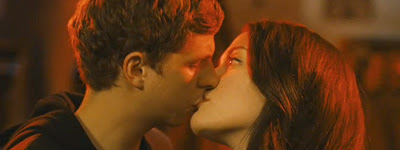 Norah wins the staring contest despite Nick's last-ditch strategy.
Norah wins the staring contest despite Nick's last-ditch strategy.Michael Cera has been typecast. For anyone who has followed his brief career, this is not news. It's just a testament to the myopia of casting directors and the dearth of actors that can portray the prototypical American teen in all his awkward glory as effectively as Cera. The titular Nick in Nick and Norah's Infinite Playlist is not a stretch for the young actor. Even if Nick is saddled with the cliches of today's youth centered movies like being in a band (I mean, who isn't?) and driving a vehicle with kitsch cred (what, they couldn't find a Gremlin?) Cera effortlessly slips into the role of Nick. Can he be too far from Cera's real life persona? Nick's Norah is played by the relatively unknown Kat Dennings. She's the girl in high school who can only be fully appreciated in hindsight, unless you're Nick. He knows there's something different about this girl. Norah is drawn to Nick too, even though he's hung up on his ex. Of course, these kids are cagey, and they know they belong together, even if they're not sure why.
It's refreshing that the high school romance drama has been elevated to this. Thanks to geek chic, the nerds are no longer the spectacle wearing next-door neighbor/best friend waiting to be noticed for his/her inner beauty by the football team captain/prom queen, and there's no high school feudal system, the basis for tension during the 80's heyday of teen movies. Screenwriter Lorene Scafaria dispenses with those trappings to give us what is the new template for the youth-centered rom-com. Think When Harry Met Sally but with teenagers and compressed to less than 24 hours. Boy meets girl. Sparks fly. Boy and girl try to screw it up. SPOILER ALERT! Boy and girl get together despite themselves. Certain cinematic youth staples endure with a slight twist: The plot is driven by coincidence but doesn't feel contrived. The villainous ex-girlfriend actually has second thoughts about kicking her old beau to the curb. The main character's sidekicks are all young gay men, and the drunk party girl is a generally good-hearted foil to the film's heroine in between bouts of chewing the scenery.
That scenery is the icing atop Nick and Norah. Director Peter Sollett films it as a valentine to New York City as much as one to budding love. The Big Apple feels quirky, warm, inviting and safe, and this New York, New York might as well be the Modesto, California of American Graffiti. These kids cruise its concrete and glass corridors with ease and without the aid of GPS.
Then there's the music and the ubiquitous playlist of the title. Beyond the synergistic yoking of a surefire bestseller soundtrack, the film is about the ways that music connects people. If there's a heady insight to be had in this breezy film, it's that mutual love of tunes may be the best predictor for a successful relationship. It's a simple premise, but it's a simple film about good-natured kids fighting through their hang-ups and following their bliss. When the sun comes up on Nick and Norah's all nighter, we suspend our cynicism. These two belong together.

